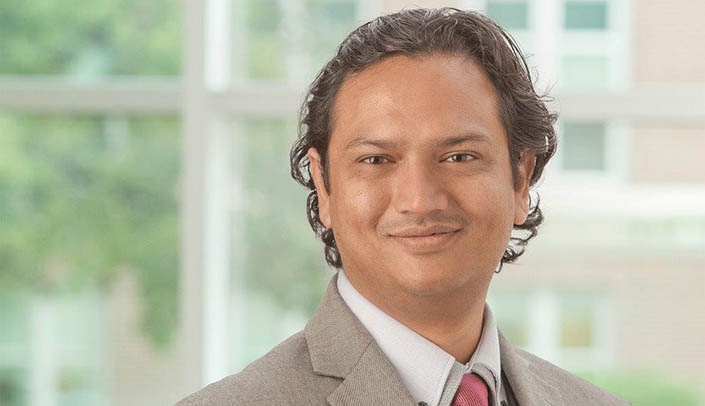Danish Bhatti, M.D., assistant professor of neurological sciences, was first inspired by UNMC’s Performance Improvement in Teaching Series (PITs) workshop from the Office of Faculty Development. As a clinician, he’d previously received no formal training in teaching.
But this workshop: “It was eye-opening,” Dr. Bhatti said. “It got me excited.”
Teaching became something he wanted to do. He was tasked with redesigning the neurology residents curriculum as the chair of the curriculum committee. The online and blended learning model got rave reviews and helped spur significant increases in Residents In Training Exam (RITE) scores for movement disorders subspecialty residents.
But then, his father provided further inspiration.
Dr. Bhatti traveled back to Pakistan to see his father, who had cancer. Dr. Bhatti would visit every several months to spend time with his dad.
“And my father said, ‘Why don’t you teach while you are here? That’s your passion.'”
Why not take advantage of being in this country?
Like many developing countries, Pakistan has good general programs. “But the missing gap is the next step, the subspecialties,” Dr. Bhatti said.
The solution had been for individual physicians to come to the U.S. or Europe to train. But that happens one person at a time.
Dr. Bhatti: “If I train one person, what impact will that have in a nation of 200 million?”
He decided to tap into his newfound skills, the toolkit provided him by UNMC.
He went to work designing a distance “mini fellowship” in movement disorders, continuing medical education in a neurological subspecialty. Physicians in Pakistan jumped at the chance to receive U.S.-level CME.
Eighteen enrolled in the inaugural class, from 13 institutions.
Online modules included recorded lectures and reading assignments. Participants and teachers discussed cases live and through some 1,200 messages. Movement disorders faculty from UNMC and across the U.S. consulted, and prepared quizzes and summaries.
The course received certificates by UNMC Center for Continuing Education, and Pakistan Society of Neurology (PSN) provided some funding and scholarships. The outcomes and lessons were presented as abstracts at the 2018 Annual Meeting of American Academy of Neurology in Los Angeles.
PSN also awarded Dr. Bhatti its International Best Teacher honor.
A Johns Hopkins faculty member, who teaches in Zambia, has joined as an observer in hopes of exchanging ideas.
The second class of enrollees just started a few weeks ago. In addition to Pakistan, applications also came from Oman, Dubai and Saudi Arabia.

Dr Bhatti exhibits the gold standard of innovative thinking and courageous actions that make academic medical centers great. If that were not enough, he has an infectious capacity to see a better future and is willing to roll up his sleeves and make things happen. I am going to enjoy watching his career evolve!
This is a cool story! Congrats to Dr. Bhatti for making this happen. Danish is a good man who has stepped up and helped out on several occasions for the UNMC Skate-a-thon for Parkinson's. We are fortunate to have him!
Dr Bhatti 's enthusiasm in teaching has encouraged dozens of Neurology Residents in Pakistan to pursue careers in movement disorders. Well done Danish.
Prof. Arsalan Ahmad, Past President, Pakistan Society of Neurology (2016-18)
Inspiring story that deserves accolades to Dr. Bhatti for crafting a "mini fellowship" that will actually impact so many people.
Congratulations for the International Best Teacher award, Dr. Bhatti.
Danish is an exemplary faculty member who makes UNMC a better academic center every day!. His passion for medical education leads to inspirational results. It is a true pleasure to have him within the Department of Neurological Sciences.